Unit 6 A French Fourth综合教程四课件
Unit-6-A-French-Fourth课文翻译综合教程四
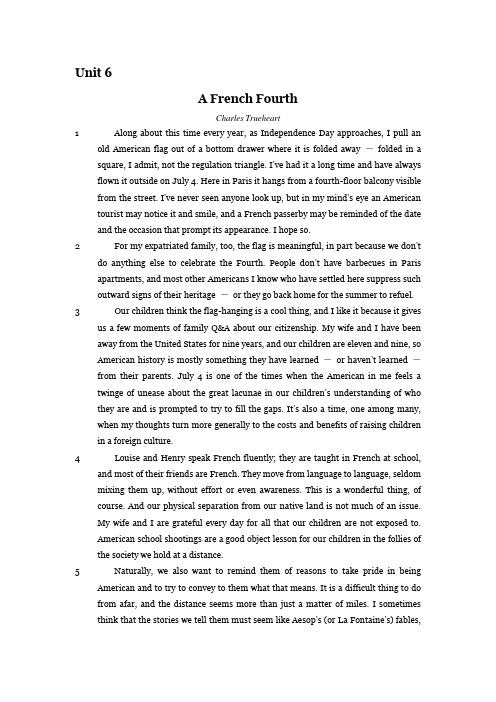
Unit 6A French FourthCharles Trueheart1Along about this time every year, as Independence Day approaches, I pull an old American flag out of a bottom drawer where it is folded away -folded in a square, I admit, not the regulation tr iangle. I’ve had it a long time and have always flown it outside on July 4. Here in Paris it hangs from a fourth-floor balcony visible from the street. I’ve never seen anyone look up, but in my mind’s eye an American tourist may notice it and smile, and a French passerby may be reminded of the date and the occasion that prompt its appearance. I hope so.2For my expatriated family, too, the flag is meaningful, in part because we don’t do anything else to celebrate the Fourth. People don’t have barbecues in Paris apartments, and most other Americans I know who have settled here suppress such outward signs of their heritage -or they go back home for the summer to refuel. 3Our children think the flag-hanging is a cool thing, and I like it because it gives us a few moments of family Q&A about our citizenship. My wife and I have been away from the United States for nine years, and our children are eleven and nine, so American history is mostly something they have learned -or haven’t learned -from their parents. July 4 is one of the times when the American in me feels a twinge of unease about the great lacunae in our children’s understanding of who they are and is prompted to try to fill the gaps. It’s also a time, one among many, when my thoughts turn more generally to the costs and benefits of raising children in a foreign culture.4Louise and Henry speak French fluently; they are taught in French at school, and most of their friends are French. They move from language to language, seldom mixing them up, without effort or even awareness. This is a wonderful thing, of course. And our physical separation from our native land is not much of an issue.My wife and I are grateful every day for all that our children are not exposed to.American school shootings are a good object lesson for our children in the follies of the society we hold at a distance.5Naturally, we also want to remind them of reasons to take pride in being American and to try to convey to them what that means. It is a difficult thing to do from afar, and the distance seems more than just a matter of miles. I sometimes think that the stories we tell them must seem like Aesop’s (or La Fontaine’s) fables,myths with no fixed place in space or time. Still, connections can be made, lessons learned.6Last summer we spent a week with my brother and his family, who live in Concord, Massachusetts, and we took the children to the North Bridge to give thema glimpse of the American Revolution. We happened to run across a reenactment ofthe skirmish that launched the war, with everyone dressed up in three-cornered hats and cotton bonnets. This probably only confirmed to our goggle-eyed kids the make-believe quality of American history.7Six months later, when we were recalling the experience at the family dinner table here, I asked Louise what the Revolution had been about. She thought that it had something to do with the man who rode his horse from town to town. “Ah”, I said, satisfaction swelling in my breast, “and what was that man’s name?”“Gulliver?” Louise replied. Henry, for his part, knew that the Revolution was between the British and the Americans, and thought that it was probably about slavery.8As we pursued this conversation, though, we learned what the children knew instead. Louise told us that the French Revolution came at the end of the Enlightenment, when people learned a lot of ideas, and one was that they didn’t need kings to tell them what to think or do. On another occasion, when Henry asked what makes a person a “junior” or a “II” or a “III”, Louise helped me answer by bringing up kings like Louis Quatorze and Quinze and Seize; Henry riposted with Henry VIII.9I can’t say I worry much about our children’s European frame of reference.There will be plenty of time for them to learn America’s pitifully brief history and to find out who Thomas Jefferson and Franklin Roosevelt were. Already they know a great deal more than I would have wished about Bill Clinton.10If all of this resonates with me, it may be because my family moved to Paris in 1954, when I was three, and I was enrolled in French schools for most of my grade-school years. I don’t remember much instruction in American studies at school or at home. I do remember that my mother took me out of school one afternoon to see the movie Oklahoma! I can recall what a faraway place it seemed: all that sunshine and square dancing and surreys with fringe on top. The sinister Jud Fry personified evil for quite some time afterward. Cowboys and Indians were an American cliché that had already reached Paris through the movies, and I askeda grandparent to send me a Davy Crockett hat so that I could live out that fairy taleagainst the backdrop of gray postwar Montparnasse.11Although my children are living in the same place at roughly the same time in their lives, their experience as expatriates is very different from mine. The particular narratives of American history aside, American culture is not theirs alone but that of their French classmates, too. The music they listen to is either “American” or “European,” but it is often hard to tell the difference. In my day little French kids looked like nothing other than little French kids; but Louise and Henry and their classmates dress much as their peers in the United States do, though with perhaps less Lands’ End fleeciness. When I returned to visit the United States in the 1950s, it was a five-day ocean crossing for a month’s home leave every two years;now we fly over for a week or two, although not very often. Virtually every imaginable product available to my children’s American cousins is now obtainable here.12If time and globalization have made France much more like the United States than it was in my youth, then I can conclude a couple of things. On the one hand, our children are confronting a much less jarring cultural divide than I did, and they have more access to their native culture. Re-entry, when it comes, is likely to be smoother. On the other hand, they are less than fully immersed in a truly foreign world. That experience no longer seems possible in Western countries -a sad development, in my view.在法国庆祝美国独立日查尔斯·特鲁哈特1 每年差不多到了独立日日益临近的时候,我都会把一面折叠好的旧的美国国旗从底层抽屉里取出——我承认我折叠国旗不是官方规定的三角形,而是正方形。
Unit 6 A French Fourth综合教程四 PPT

Unit 6 A French Fourth
Audiovisual supplement Cultural information
Watch the video and answer the following questions. • Why did Denise hit Paul?
Because Paul said that his father was stupid.
Audiovisual supplement Cultural information
1. Independence Day
In the United States, Independence Day, commonly known as the Fourth of July, is a federal holiday commemorating the adoption of the Declaration of Independence on July 4, 1776, declaring independence from the Kingdom of Great Britain. Independence Day is commonly associated with fireworks, parades, barbecues, carnivals, picnics, concerts, baseball games, political speeches and ceremonies, and various other public and private events celebrating the history, government, and traditions of the United States.
Unit-6--A-French-fourth
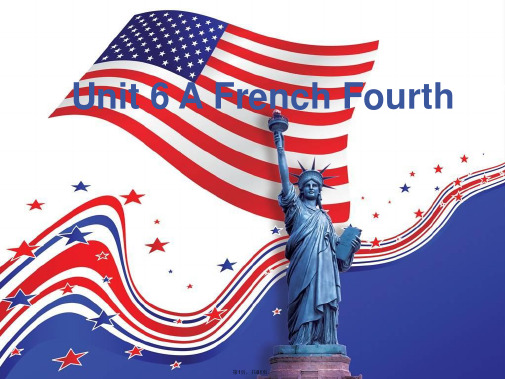
Why do we celebrate the 4th of July?
• People started getting mad and began making plans to be able to make their own rules. They no longer wanted Great Britain to be able to tell them what to do, so they decided to tell Great Britain that they were becoming an
第16页,共81页。
Why do we celebrate the 4th of July?
• The people who signed the Declaration risked being hanged for treason by the leaders in Great Britain. They had to be very brave to sign something that would be considered a crime!
• Independence Day is the national day of the United States
第5页,共81页。
Independence Day
• On July 4, 2006: The United States of
America celebrates 230th year since
第18页,共81页。
Symbols of the USA
• The Stars and Stripes (the US flag), • The Great Seal of the USA,
综英4 Unit 6 A French Fourth
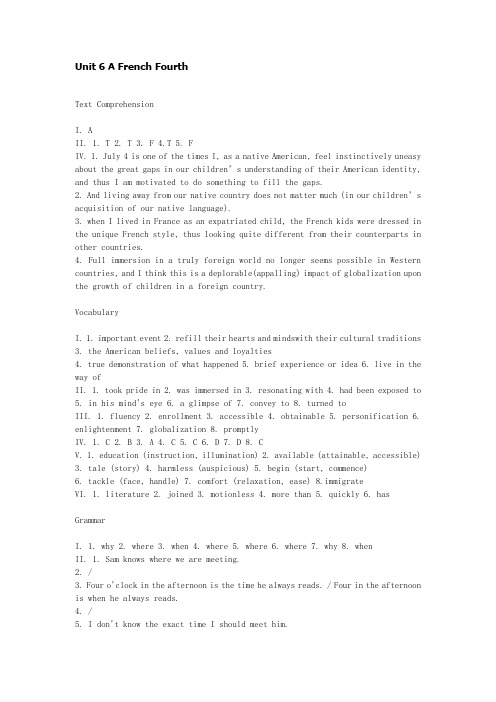
Unit 6 A French FourthText ComprehensionI. AII. 1. T 2. T 3. F 4.T 5. FIV. 1. July 4 is one of the times I, as a native American, feel instinctively uneasy about the great gaps in our children’s understanding of their American identity, and thus I am motivated to do something to fill the gaps.2. And living away from our native country does not matter much (in our children’s acquisition of our native language).3. when I lived in France as an expatriated child, the French kids were dressed in the unique French style, thus looking quite different from their counterparts in other countries.4. Full immersion in a truly foreign world no longer seems possible in Western countries, and I think this is a deplorable(appalling) impact of globalization upon the growth of children in a foreign country.VocabularyI. 1. important event 2. refill their hearts and mindswith their cultural traditions3. the American beliefs, values and loyalties4. true demonstration of what happened5. brief experience or idea6. live in the way ofII. 1. took pride in 2. was immersed in 3. resonating with 4. had been exposed to 5. in his mind's eye 6. a glimpse of 7. convey to 8. turned toIII. 1. fluency 2. enrollment 3. accessible 4. obtainable 5. personification 6. enlightenment 7. globalization 8. promptlyIV. 1. C 2. B 3. A 4. C 5. C 6. D 7. D 8. CV. 1. education (instruction, illumination) 2. available (attainable, accessible) 3. tale (story) 4. harmless (auspicious) 5. begin (start, commence)6. tackle (face, handle)7. comfort (relaxation, ease)8.immigrateVI. 1. literature 2. joined 3. motionless 4. more than 5. quickly 6. hasGrammarI. 1. why 2. where 3. when 4. where 5. where 6. where 7. why 8. whenII. 1. Sam knows where we are meeting.2. /3. Four o'clock in the afternoon is the time he always reads. / Four in the afternoon is when he always reads.4. /5. I don't know the exact time I should meet him.6. The reason he resigned is still unknown.7. I remember the morning he first came to school.8. I'll never forget the day we first met.III. 2 3 1; 4 6 5IV. 1. When Mrs Brown arrived home, she found that her flat had been robbed and all her silver had been taken. Enquires were made by the police to find out possible clues. The burlgar hasn't been caught yet but he is expected to be arrested before long.2. After a hideout for terrorists had been discovered yesterday a raid was carried out by the police and five terrorists were arrested. The police said more terrorists are expected to be arrested in the next few days.V. 1. shall 2. should 3. shall 4. would 5. would 6. will 7. shall 8.willTranslationI. 1. 虽然我没见过有人抬头看它一眼,但打心眼里希望来自美国的旅游者能看到它并会心一笑,或者路过此地的法国人能想到悬挂它的日期和理由。
Unit-6-A-French-Fourth课文翻译综合教程四

Unit 6A French FourthCharles Trueheart1Along about this time every year, as Independence Day approaches, I pull an old American flag out of a bottom drawer where it is folded away -folded in a square, I admit, not the regulation tr iangle. I’ve had it a long time and have always flown it outside on July 4. Here in Paris it hangs from a fourth-floor balcony visible from the street. I’ve never seen anyone look up, but in my mind’s eye an American tourist may notice it and smile, and a French passerby may be reminded of the date and the occasion that prompt its appearance. I hope so.2For my expatriated family, too, the flag is meaningful, in part because we don’t do anything else to celebrate the Fourth. People don’t have barbecues in Paris apartments, and most other Americans I know who have settled here suppress such outward signs of their heritage -or they go back home for the summer to refuel. 3Our children think the flag-hanging is a cool thing, and I like it because it gives us a few moments of family Q&A about our citizenship. My wife and I have been away from the United States for nine years, and our children are eleven and nine, so American history is mostly something they have learned -or haven’t learned -from their parents. July 4 is one of the times when the American in me feels a twinge of unease about the great lacunae in our children’s understanding of who they are and is prompted to try to fill the gaps. It’s also a time, one among many, when my thoughts turn more generally to the costs and benefits of raising children in a foreign culture.4Louise and Henry speak French fluently; they are taught in French at school, and most of their friends are French. They move from language to language, seldom mixing them up, without effort or even awareness. This is a wonderful thing, of course. And our physical separation from our native land is not much of an issue.My wife and I are grateful every day for all that our children are not exposed to.American school shootings are a good object lesson for our children in the follies of the society we hold at a distance.5Naturally, we also want to remind them of reasons to take pride in being American and to try to convey to them what that means. It is a difficult thing to do from afar, and the distance seems more than just a matter of miles. I sometimes think that the stories we tell them must seem like Aesop’s (or La Fontaine’s) fables,myths with no fixed place in space or time. Still, connections can be made, lessons learned.6Last summer we spent a week with my brother and his family, who live in Concord, Massachusetts, and we took the children to the North Bridge to give thema glimpse of the American Revolution. We happened to run across a reenactment ofthe skirmish that launched the war, with everyone dressed up in three-cornered hats and cotton bonnets. This probably only confirmed to our goggle-eyed kids the make-believe quality of American history.7Six months later, when we were recalling the experience at the family dinner table here, I asked Louise what the Revolution had been about. She thought that it had something to do with the man who rode his horse from town to town. “Ah”, I said, satisfaction swelling in my breast, “and what was that man’s name?”“Gulliver?” Louise replied. Henry, for his part, knew that the Revolution was between the British and the Americans, and thought that it was probably about slavery.8As we pursued this conversation, though, we learned what the children knew instead. Louise told us that the French Revolution came at the end of the Enlightenment, when people learned a lot of ideas, and one was that they didn’t need kings to tell them what to think or do. On another occasion, when Henry asked what makes a person a “junior” or a “II” or a “III”, Louise helped me answer by bringing up kings like Louis Quatorze and Quinze and Seize; Henry riposted with Henry VIII.9I can’t say I worry much about our children’s European frame of reference.There will be plenty of time for them to learn America’s pitifully brief history and to find out who Thomas Jefferson and Franklin Roosevelt were. Already they know a great deal more than I would have wished about Bill Clinton.10If all of this resonates with me, it may be because my family moved to Paris in 1954, when I was three, and I was enrolled in French schools for most of my grade-school years. I don’t remember much instruction in American studies at school or at home. I do remember that my mother took me out of school one afternoon to see the movie Oklahoma! I can recall what a faraway place it seemed: all that sunshine and square dancing and surreys with fringe on top. The sinister Jud Fry personified evil for quite some time afterward. Cowboys and Indians were an American cliché that had already reached Paris through the movies, and I askeda grandparent to send me a Davy Crockett hat so that I could live out that fairy taleagainst the backdrop of gray postwar Montparnasse.11Although my children are living in the same place at roughly the same time in their lives, their experience as expatriates is very different from mine. The particular narratives of American history aside, American culture is not theirs alone but that of their French classmates, too. The music they listen to is either “American” or “European,” but it is often hard to tell the difference. In my day little French kids looked like nothing other than little French kids; but Louise and Henry and their classmates dress much as their peers in the United States do, though with perhaps less Lands’ End fleeciness. When I returned to visit the United States in the 1950s, it was a five-day ocean crossing for a month’s home leave every two years;now we fly over for a week or two, although not very often. Virtually every imaginable product available to my children’s American cousins is now obtainable here.12If time and globalization have made France much more like the United States than it was in my youth, then I can conclude a couple of things. On the one hand, our children are confronting a much less jarring cultural divide than I did, and they have more access to their native culture. Re-entry, when it comes, is likely to be smoother. On the other hand, they are less than fully immersed in a truly foreign world. That experience no longer seems possible in Western countries -a sad development, in my view.在法国庆祝美国独立日查尔斯·特鲁哈特1 每年差不多到了独立日日益临近的时候,我都会把一面折叠好的旧的美国国旗从底层抽屉里取出——我承认我折叠国旗不是官方规定的三角形,而是正方形。
unit 6 A French Fourth课件

PPT学习交流
10
• He was like a cat on hot bricks before his final examination.
在考试之前,他急得像热锅上的蚂蚁。
❖He is as pooபைடு நூலகம் as a church mouse.
他一贫如洗。
PPT学习交流
←¤
11
Contrast
Para.4
children’s acquisition of native language).
PPT学习交流
6
Detailed Reading of Para. 4
◆“American school shootings are a good object lesson for our children in the follies
• This is a wonderful thing, of course.
•…our physical separation from our native land is not much of an issue
Para.5
• It is a difficult thing to do….
•…the distance seems more than just a matter of miles.
The fables remain a popular choice for moral education of children today.
PPT学习交流
14
La Fontaine’s Fables
It is a collection of ancient fables which have been reorganized by La Fontaine, a superficial writer of moral lessons for children.
综合英语4 Unit6 A French Fourth(课堂PPT)
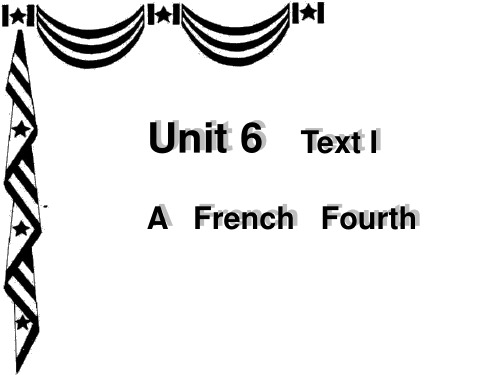
2020/7/30
5
Language Work
• 文中出现的重难点单词及短语: • fold away, expatriate, convey, • happen to, confirm, recall, • pursue, bring up, sinister, • peer, immerse
2020/7/30
2020/7/30
8
• <点拨>
➢ exile特指离开某人的祖国,或因遭到法律上的驱 逐非自愿地离开或因形势不利而自愿地离开,例如:
➢ When the government was overthrown,the
royal family was exiled.
政府被推翻后,皇室遭到驱逐。
➢ expatriate常常是自愿地离开并可能意味着国籍的 改变。
• His sinister threat chilled all who heard it. • 他这一凶恶的威胁使所有听到的人不寒而栗。
• <点拨>sinister. baleful. malign都含有“凶险,邪恶”之意, 但有所区别。
• sinister暗含潜在的危险,有种不祥的预兆,如: • The Kremlin has sinister connotations…The aesthetic
6
➢fold away : 1) make something into a smaller, neater shape by folding it, usually several times
• These camping chairs can be folded away and put in the trunk.
A French FourthPPT教学课件

2020/12/10
4
The main part
• Part 2(4-9):This part is the main body of the essay, in which the author tells us what is good and what is bad in living in a foreign country. He supports his arguments with the experience of his own family and the difference between his generation and the generation of his own children.
• Para5: it is rather difficult for the children to understand the historical heritages of their motherland
2020/12/10
6
• Para6: during the summer vacation, they took the children to learn details of the American Revolution. But the children cannot completely grasp the gist of what they saw or heard.
2020/12/10
2
The beginning part
• Part 1 (1-3) : the author starts with a way of celebrating his home country’s National Day-----hang out an old American flag from a fourth-floor balcony and the reasons why he do so.
Unit6AFrenchFourth课文翻译综合教程四.doc
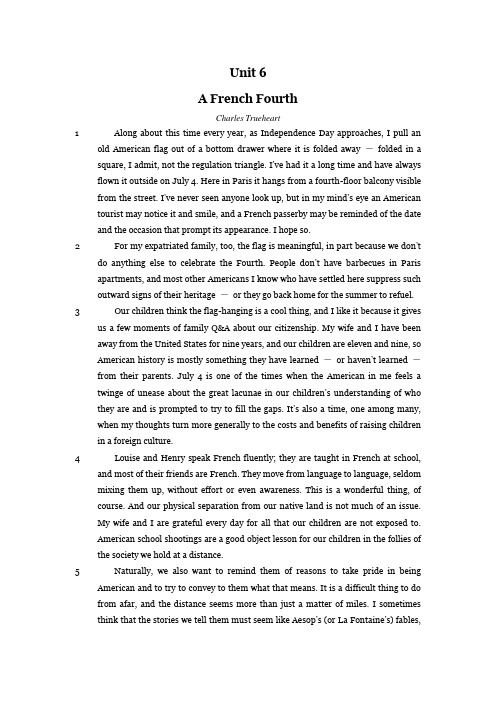
Unit 6A French FourthCharles Trueheart1Along about this time every year, as Independence Day approaches, I pull an old American flag out of a bottom drawer where it is folded away -folded in a square, I admit, not the regulation triangle. I’ve had it a long time and have always flown it outside on July 4. Here in Paris it hangs from a fourth-floor balcony visible from the street. I’ve never seen anyone look up, but in my mind’s eye an American tourist may notice it and smile, and a French passerby may be reminded of the date and the occasion that prompt its appearance. I hope so.2For my expatriated family, too, the flag is meaningful, in part because we don’t do anything else to celebrate the Fourth. People don’t have barbecues in Paris apartments, and most other Americans I know who have settled here suppress such outward signs of their heritage -or they go back home for the summer to refuel. 3Our children think the flag-hanging is a cool thing, and I like it because it gives us a few moments of family Q&A about our citizenship. My wife and I have been away from the United States for nine years, and our children are eleven and nine, so American history is mostly something they have learned -or haven’t learned -from their parents. July 4 is one of the times when the American in me feels a twinge of unease about the great lacunae in our children’s understanding of who they are and is prompted to try to fill the gaps. It’s also a time, one among many, when my thoughts turn more generally to the costs and benefits of raising children in a foreign culture.4Louise and Henry speak French fluently; they are taught in French at school, and most of their friends are French. They move from language to language, seldom mixing them up, without effort or even awareness. This is a wonderful thing, of course. And our physical separation from our native land is not much of an issue.My wife and I are grateful every day for all that our children are not exposed to.American school shootings are a good object lesson for our children in the follies of the society we hold at a distance.5Naturally, we also want to remind them of reasons to take pride in being American and to try to convey to them what that means. It is a difficult thing to do from afar, and the distance seems more than just a matter of miles. I sometimes think that the stories we tell them must seem like Aesop’s (or La Fontaine’s) fables,myths with no fixed place in space or time. Still, connections can be made, lessons learned.6Last summer we spent a week with my brother and his family, who live in Concord, Massachusetts, and we took the children to the North Bridge to give thema glimpse of the American Revolution. We happened to run across a reenactment ofthe skirmish that launched the war, with everyone dressed up in three-cornered hats and cotton bonnets. This probably only confirmed to our goggle-eyed kids the make-believe quality of American history.7Six months later, when we were recalling the experience at the family dinner table here, I asked Louise what the Revolution had been about. She thought that it had something to do with the man who rode his horse from town to town. “Ah”, I said, satisfaction swelling in my breast, “and what was that man’s name?”“Gulliver?” Lou ise replied. Henry, for his part, knew that the Revolution was between the British and the Americans, and thought that it was probably about slavery.8As we pursued this conversation, though, we learned what the children knew instead. Louise told us that the French Revolution came at the end of the Enlightenment, when people learned a lot of ideas, and one was that they didn’t need kings to tell them what to think or do. On another occasion, when Henry asked what makes a person a “junior” or a “II” or a“III”, Louise helped me answer by bringing up kings like Louis Quatorze and Quinze and Seize; Henry riposted with Henry VIII.9I can’t say I worry much about our children’s European frame of reference.There will be plenty of time for them to learn Am erica’s pitifully brief history and to find out who Thomas Jefferson and Franklin Roosevelt were. Already they know a great deal more than I would have wished about Bill Clinton.10If all of this resonates with me, it may be because my family moved to Paris in 1954, when I was three, and I was enrolled in French schools for most of my grade-school years. I don’t remember much instruction in American studies at school or at home. I do remember that my mother took me out of school one afternoon to see the movie Oklahoma! I can recall what a faraway place it seemed: all that sunshine and square dancing and surreys with fringe on top. The sinister Jud Fry personified evil for quite some time afterward. Cowboys and Indians were an American cliché that had already reached Paris through the movies, and I askeda grandparent to send me a Davy Crockett hat so that I could live out that fairy taleagainst the backdrop of gray postwar Montparnasse.11Although my children are living in the same place at roughly the same time in their lives, their experience as expatriates is very different from mine. The particular narratives of American history aside, American culture is not theirs alone but that of their French classmates, too. The music they listen to is either “American” or “European,” but it is often hard to tell the difference. In my day little French kids looked like nothing other than little French kids; but Louise and Henry and their classmates dress much as their peers in the United States do, though with pe rhaps less Lands’ End fleeciness. When I returned to visit the United States in the 1950s, it was a five-day ocean crossing for a month’s home leave every two years;now we fly over for a week or two, although not very often. Virtually every imaginable pro duct available to my children’s American cousins is now obtainable here.12If time and globalization have made France much more like the United States than it was in my youth, then I can conclude a couple of things. On the one hand, our children are confronting a much less jarring cultural divide than I did, and they have more access to their native culture. Re-entry, when it comes, is likely to be smoother. On the other hand, they are less than fully immersed in a truly foreign world. That experience no longer seems possible in Western countries -a sad development, in my view.在法国庆祝美国独立日查尔斯·特鲁哈特1 每年差不多到了独立日日益临近的时候,我都会把一面折叠好的旧的美国国旗从底层抽屉里取出——我承认我折叠国旗不是官方规定的三角形,而是正方形。
(完整版)Unit6AFrenchFourth课文翻译综合教程四
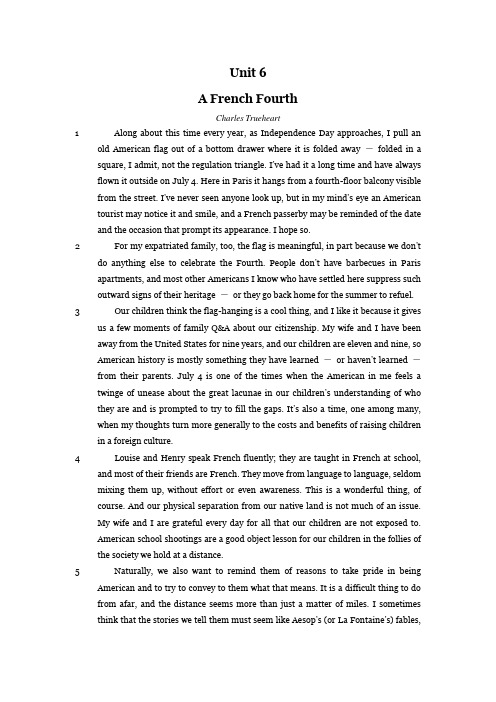
Unit 6A French FourthCharles Trueheart1Along about this time every year, as Independence Day approaches, I pull an old American flag out of a bottom drawer where it is folded away -folded in a square, I admit, not the regulation triangle. I’ve had it a long time and have always flown it outside on July 4. Here in Paris it hangs from a fourth-floor balcony visible from the street. I’ve never seen anyone look up, but in my mind’s eye an American tourist may notice it and smile, and a French passerby may be reminded of the date and the occasion that prompt its appearance. I hope so.2For my expatriated family, too, the flag is meaningful, in part because we don’t do anything else to celebrate the Fourth. People don’t have barbecues in Paris apartments, and most other Americans I know who have settled here suppress such outward signs of their heritage -or they go back home for the summer to refuel. 3Our children think the flag-hanging is a cool thing, and I like it because it gives us a few moments of family Q&A about our citizenship. My wife and I have been away from the United States for nine years, and our children are eleven and nine, so American history is mostly something they have learned -or haven’t learned -from their parents. July 4 is one of the times when the American in me feels a twinge of unease about the great lacunae in our children’s understanding of who they are and is prompted to try to fill the gaps. It’s also a time, one among many, when my thoughts turn more generally to the costs and benefits of raising children in a foreign culture.4Louise and Henry speak French fluently; they are taught in French at school, and most of their friends are French. They move from language to language, seldom mixing them up, without effort or even awareness. This is a wonderful thing, of course. And our physical separation from our native land is not much of an issue.My wife and I are grateful every day for all that our children are not exposed to.American school shootings are a good object lesson for our children in the follies of the society we hold at a distance.5Naturally, we also want to remind them of reasons to take pride in being American and to try to convey to them what that means. It is a difficult thing to do from afar, and the distance seems more than just a matter of miles. I sometimes think that the stories we tell them must seem like Aesop’s (or La Fontaine’s) fables,myths with no fixed place in space or time. Still, connections can be made, lessons learned.6Last summer we spent a week with my brother and his family, who live in Concord, Massachusetts, and we took the children to the North Bridge to give thema glimpse of the American Revolution. We happened to run across a reenactment ofthe skirmish that launched the war, with everyone dressed up in three-cornered hats and cotton bonnets. This probably only confirmed to our goggle-eyed kids the make-believe quality of American history.7Six months later, when we were recalling the experience at the family dinner table here, I asked Louise what the Revolution had been about. She thought that it had something to do with the man who rode his horse from town to town. “Ah”, I said, satisfaction swelling in my breast, “and what was that man’s name?”“Gulliver?” Lou ise replied. Henry, for his part, knew that the Revolution was between the British and the Americans, and thought that it was probably about slavery.8As we pursued this conversation, though, we learned what the children knew instead. Louise told us that the French Revolution came at the end of the Enlightenment, when people learned a lot of ideas, and one was that they didn’t need kings to tell them what to think or do. On another occasion, when Henry asked what makes a person a “junior” or a “II” or a“III”, Louise helped me answer by bringing up kings like Louis Quatorze and Quinze and Seize; Henry riposted with Henry VIII.9I can’t say I worry much about our children’s European frame of reference.There will be plenty of time for them to learn Am erica’s pitifully brief history and to find out who Thomas Jefferson and Franklin Roosevelt were. Already they know a great deal more than I would have wished about Bill Clinton.10If all of this resonates with me, it may be because my family moved to Paris in 1954, when I was three, and I was enrolled in French schools for most of my grade-school years. I don’t remember much instruction in American studies at school or at home. I do remember that my mother took me out of school one afternoon to see the movie Oklahoma! I can recall what a faraway place it seemed: all that sunshine and square dancing and surreys with fringe on top. The sinister Jud Fry personified evil for quite some time afterward. Cowboys and Indians were an American cliché that had already reached Paris through the movies, and I askeda grandparent to send me a Davy Crockett hat so that I could live out that fairy taleagainst the backdrop of gray postwar Montparnasse.11Although my children are living in the same place at roughly the same time in their lives, their experience as expatriates is very different from mine. The particular narratives of American history aside, American culture is not theirs alone but that of their French classmates, too. The music they listen to is either “American” or “European,” but it is often hard to tell the difference. In my day little French kids looked like nothing other than little French kids; but Louise and Henry and their classmates dress much as their peers in the United States do, though with pe rhaps less Lands’ End fleeciness. When I returned to visit the United States in the 1950s, it was a five-day ocean crossing for a month’s home leave every two years;now we fly over for a week or two, although not very often. Virtually every imaginable pro duct available to my children’s American cousins is now obtainable here.12If time and globalization have made France much more like the United States than it was in my youth, then I can conclude a couple of things. On the one hand, our children are confronting a much less jarring cultural divide than I did, and they have more access to their native culture. Re-entry, when it comes, is likely to be smoother. On the other hand, they are less than fully immersed in a truly foreign world. That experience no longer seems possible in Western countries -a sad development, in my view.在法国庆祝美国独立日查尔斯·特鲁哈特1 每年差不多到了独立日日益临近的时候,我都会把一面折叠好的旧的美国国旗从底层抽屉里取出——我承认我折叠国旗不是官方规定的三角形,而是正方形。
Unit 6 A French Fourth综合教程四(课堂PPT)
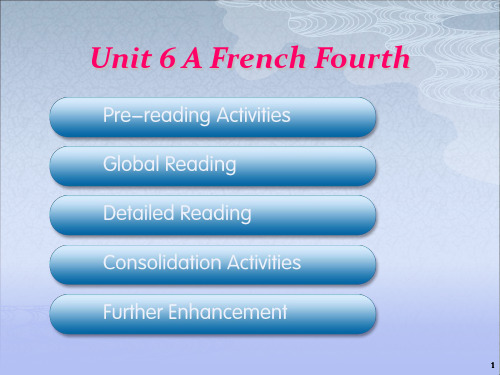
apologizing to Paul? Because no matter what, one does not hit people and Denise should know better than that. 3. What’s Paul’s father, Quinlin’s attitude towards the matter? It is no big deal. Kids will make it up themselves.
2
Audiovisual supplement Cultural information
4. What do you think are the differences in educating children between Chinese and the Americans? open-ended.
On June 14, 1777, in order to establish an official flag for the new nation, the Continental Congress passed the first Flag Act: “Resolved, That the flag of the United States be made of thirteen stripes, alternate red and white; that the union be thirteen stars, white in a blue field, representing a new Constellatilement Cultural information
- 1、下载文档前请自行甄别文档内容的完整性,平台不提供额外的编辑、内容补充、找答案等附加服务。
- 2、"仅部分预览"的文档,不可在线预览部分如存在完整性等问题,可反馈申请退款(可完整预览的文档不适用该条件!)。
- 3、如文档侵犯您的权益,请联系客服反馈,我们会尽快为您处理(人工客服工作时间:9:00-18:30)。
1ห้องสมุดไป่ตู้
Audiovisual supplement Cultural information
Watch the video and answer the following questions. 1. Why did Denise hit Paul?
Because Paul said that his father was stupid. 2. Why do you think Xu Datong insists on Denise
know better than that. Xu Datong: Denise, I want you to apologize to Paul. Quinlin: It’s no big deal. Xu Datong: Yes, it is. Come on, apologize to Paul. Denise: Going to win. Xu Datong: Say you’re sorry. Quinlin: The kids are fine; they make up. Let it go. Xu Datong: Come on. Count three. One … two … two
2
Audiovisual supplement Cultural information
4. What do you think are the differences in educating children between Chinese and the Americans? open-ended.
6
Audiovisual supplement Cultural information
1. Independence Day
In the United States, Independence Day, commonly known as the Fourth of July, is a federal holiday commemorating the adoption of the Declaration of Independence on July 4, 1776, declaring independence from the Kingdom of Great Britain. Independence Day is commonly associated with fireworks, parades, barbecues, carnivals, picnics, concerts, baseball games, political speeches and ceremonies, and various other public and private events celebrating the history, government, and traditions of the United States.
and half …
5
Audiovisual supplement Cultural information
(Denise spit on Paul and Li Datong hit Denise on the head.) Jian Ning: Datong! Xu Datong: Say that you’re sorry. Denise: He said that you’re stupid. Li Datong’s father: 当面教子背后教妻。啊?
On June 14, 1777, in order to establish an official flag for the new nation, the Continental Congress passed the first Flag Act: “Resolved, That the flag of the United States be made of thirteen stripes, alternate red and white; that the union be thirteen stars, white in a blue field, representing a new Constellation.”
7
Audiovisual supplement Cultural information
2. American Flag For more than 200 years,
the American flag has been the symbol of the nation’s strength and unity. It’s been a source of pride and inspiration for millions of citizens.
3
Audiovisual supplement Cultural information
From The Gua-Sha Treatment
4
Audiovisual supplement Cultural information
Jian Ning: Denise, why did you hit Paul? Denise: He hit me too. Jian Ning: It doesn’t matter. You don’t hit people. You
apologizing to Paul? Because no matter what, one does not hit people and Denise should know better than that. 3. What’s Paul’s father, Quinlin’s attitude towards the matter? It is no big deal. Kids will make it up themselves.
